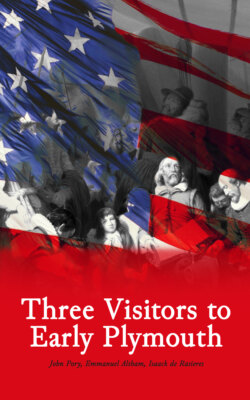Читать книгу Three Visitors to Early Plymouth - John Pory - Страница 5
На сайте Литреса книга снята с продажи.
ОглавлениеJOHN PORY
Table of Contents
John Pory (1572-1635)
Table of Contents
John Pory had led a full life before he visited Plymouth and New England in 1622, on his way home from a three-year term as Secretary to the Governor and Council of Virginia. Born into the family of a Norfolk gentleman, a graduate of Gonville and Caius College, Cambridge, he had been an apprentice to the great historian of English seafaring, Richard Hakluyt. After producing a successful book on Africa in 1600, he left the scholarly life, served eminent men as private correspondent on news from London, sat in Parliament from 1605 to 1611, acted as aide to various diplomats, went on missions for King James I and his Privy Council, and traveled in Ireland, France, Italy, Greece, and Turkey. By 1619, when he received his Virginia appointment, he had many friends, a restless foot, large girth, and fondness for wine.
The New World was a strange one for Pory, but always optimistic, he turned his back on conviviality and news of the capital to accept water and good books with enthusiasm. He also made a name for himself as an explorer on a small scale and earned lasting fame as the very able speaker of the first colonial assembly, called in 1619.
Even before leaving England for America, Pory embroiled himself in the party strife which led to the downfall of the Virginia Company in 1624. Appointed by the “ins,” at the request of his cousin, Gov. Yeardley, Pory ultimately sided with the group led by the Earl of Warwick, the “outs” from 1619 to 1624. He earned an appointment to the panel of Commissioners to inspect affairs in Virginia for the Privy Council in 1624, and on his return, received a place on the board chosen to establish royal government in the colony. He spent several years at his old occupation of London correspondent before he made his home in Lincolnshire, where he died in 1635.
John Pory stopped at New England on his way back to England partly on Company business. Ships had often gone north from Virginia to fish, before the king granted monopoly rights over fishing to the Council for New England, created in 1620. The Virginia Company thought its interests damaged, continued to sell licenses to fish in the disputed area, and futilely protested the monopoly in the Privy Council. Pory was to get the Company firsthand information about the fishing business in New England, see what the Council for New England was actually doing, and assess the prospects of the Plymouth settlement. The extracts from his letters which follow were probably written as reports.
The originals of Pory’s letters are gone, as far as anyone knows. What exists is a copy, probably made by Richard Norwood, surveyor of the “Summer Isles” (Bermudas). The manuscript is unsigned, undated and consists of extracts from two letters by John Pory and a description of Bermuda by Norwood. It is in the John Carter Brown Library, Providence, Rhode Island. The whole text, edited, annotated, and introduced by Champlin Burrage, was printed under the title, John Pory’s Lost Description of Plymouth in the Earliest Days of the Pilgrim Fathers (1918). This edition, plus photostats of the manuscript, were used in the preparation of the text printed here.
NEW ENGLAND ABOUT 1625
